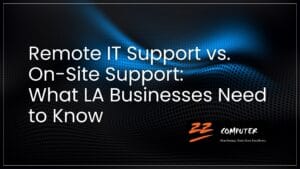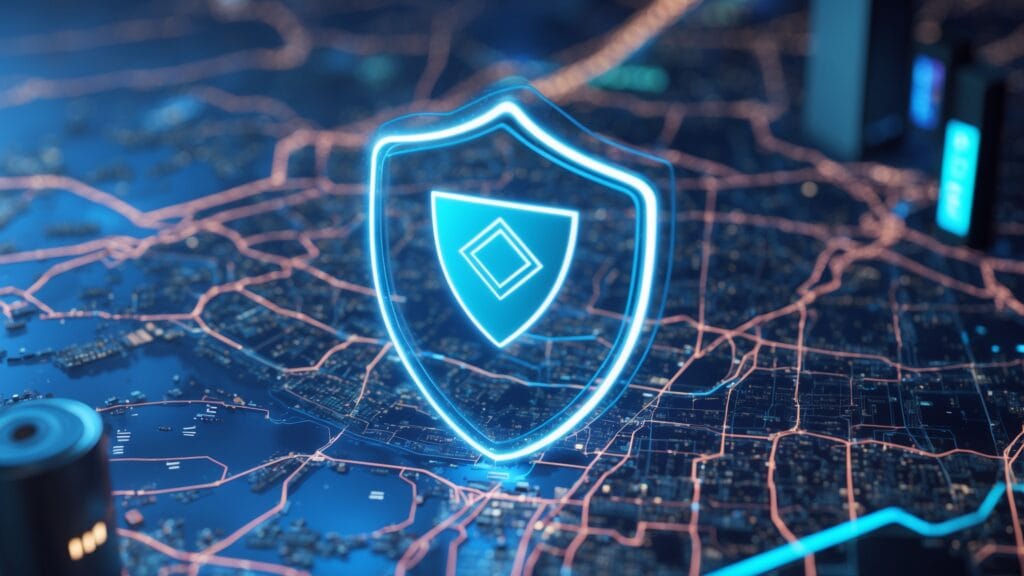
- Contact Sales:
- (310) 826-6800

What would happen if your business lost access to its systems for six hours on a Monday? No email. No cloud files. No CRM. No phones. For hundreds of small businesses across Los Angeles, this isn’t a hypothetical, it’s what happens after a phishing attack, ransomware breach or internal security failure.
Cybersecurity has become a critical part of daily operations for every small business, whether you’re running a real estate office in Brentwood, a dental practice in Beverly Hills, or a nonprofit in Santa Monica. Yet many local businesses still lack basic protections, like strong passwords, secure backups, or staff training.
This guide walks through the biggest cybersecurity threats facing small businesses in 2025, the systems you need to stay protected, and what to look for in a consulting partner. Whether you’ve had a close call or want to avoid becoming a headline, here’s what you need to know now.
Cybercrime used to be something only large corporations worried about. But today, small businesses are the most common targets. They’re often less protected, less prepared, and more likely to pay for the damage.
In Los Angeles, where industries like real estate, legal services, healthcare, and finance thrive on fast communication and digital transactions, the risks are even higher. A single phishing email can expose client data, halt operations, or lock your systems behind a ransom screen.
According to recent reports:
The reality? Most small businesses in LA don’t have dedicated IT security staff. And without managed support, they’re relying on outdated systems, basic antivirus, and the hope that nothing goes wrong.
That’s a dangerous bet.
Cybersecurity isn’t just about tech. It’s about protecting your business reputation, client trust, financial stability, and operational continuity. Whether you’re storing documents in the cloud, managing sensitive client files, or using mobile devices to run your business, you need safeguards in place.
Cyber threats are evolving fast, and many of the most damaging attacks are now aimed directly at small businesses. Why? Because they’re often easier targets: less protected, more reliant on cloud tools, and more likely to respond under pressure.
Here are some of the top threats small businesses in Los Angeles need to be aware of this year:
Phishing emails are still the #1 way that hackers get into small business systems. These emails often look like invoices, internal requests, or even client communications. One click, and an attacker can install malware, steal login credentials, or intercept sensitive data.
Ransomware encrypts your files and locks you out of your systems until you pay a fee, often in cryptocurrency. Small businesses are particularly vulnerable because many don’t have isolated backups or tested recovery plans. In cities like Los Angeles, where real-time access to documents is essential, even a short disruption can derail closings, appointments, and billing cycles.
Far too many businesses still rely on easy-to-guess passwords, or worse, reuse the same ones across accounts. Without MFA, a stolen or guessed password gives hackers full access. This is one of the most preventable yet still common issues in small business security.
Not all breaches come from outside your company. Former employees, contractors, or even well-meaning staff can accidentally expose data or intentionally misuse access. Without user permissions and account monitoring, it’s hard to detect until it’s too late.
More businesses are using Google Workspace, Microsoft 365, Dropbox, and other cloud tools, but many don’t realize those tools aren’t automatically secure. Shared folders, public links, or improper admin settings can expose sensitive client information without anyone realizing it.
Each of these threats has real-world consequences—from stolen client data to financial loss to reputational damage. And none of them require an advanced hacker to pull off. In most cases, these attacks succeed because basic protections aren’t in place.
Want a breakdown of each threat with real examples and practical defenses? Read our full post on the top cybersecurity threats facing LA businesses.

Securing your business doesn’t require a full-time IT team or expensive software, but it does require a clear strategy. At its core, cybersecurity is about putting smart, preventative systems in place before something goes wrong. For small businesses in Los Angeles, especially those handling client records, financial data, or sensitive communications, here’s what that strategy should include:
Cybercriminals often exploit known vulnerabilities in outdated software. Make sure all your devices, apps, and systems receive regular security updates. This includes everything from your operating system to your website plugins.
Firewalls help block unauthorized access to your network, while antivirus software scans for malicious files. These are the basic building blocks of digital defense, yet many small businesses still rely on free or outdated tools.
If your business stores files in Google Drive, Dropbox, or Microsoft 365, make sure those environments are configured properly. Pair that with scheduled backups stored in a separate, secure location, so you can recover quickly after an incident.
A cybersecurity audit gives you a snapshot of your current risks. It reveals where your defenses are strong and where you’re vulnerable before an attacker finds the gaps. Audits should be performed at least once a year, and after any major system changes.
Adding MFA to your accounts is one of the simplest, most effective ways to stop unauthorized access. It adds a second layer of protection, even if a password is stolen or guessed. Not sure how to implement MFA across your business? This guide walks you through it in under 30 minutes.
Most breaches start with human error: clicking a bad link, sharing a password, or ignoring a security update. A short training session can go a long way toward helping staff recognize and avoid threats.
If your team uses laptops, phones, or tablets for work, those devices need to be secured and monitored. The same goes for your office Wi-Fi and internal network. Access should be limited, encrypted, and monitored for unusual activity.
A solid cybersecurity strategy doesn’t have to be complicated, but it does need to be intentional. Every measure you take reduces the chances of a costly breach and improves your ability to recover if one happens.
Most small businesses don’t realize they have cybersecurity gaps until it’s too late. A cybersecurity audit helps identify those weak points before they turn into problems.
An audit is a systematic review of your current systems, policies, devices, and software. It checks outdated tools, misconfigurations, unsecured access points, and risky behaviors that could expose your data. Think of it like a health check for your digital infrastructure.
For Los Angeles businesses that rely on remote teams, cloud-based storage, or customer-facing platforms, regular audits are especially important. They help ensure you’re meeting compliance requirements, maintaining data integrity, and proactively addressing vulnerabilities as technology evolves.
Want to learn what’s included in an audit and how to prepare? Read our full guide: What Is a Cybersecurity Audit? And Does Your Business Need One?

It’s easy to think of cybersecurity as an abstract threat-until it becomes your reality. For small businesses in Los Angeles, a data breach isn’t just a tech issue. It can cause serious financial, legal, and reputational damage that’s hard to recover from.
Here are a few real-world breach scenarios that mirror what happens to small businesses every day:
A real estate agency receives a phishing email that looks like it’s from a title company. An agent unknowingly forwards it to a client, who then wires $80,000 to a fraudulent account. Because the breach originated from the agency’s email system, trust is lost-and legal action may follow.
An employee at a professional services firm leaves their work laptop in a car overnight. It gets stolen, and the device didn’t have encryption or remote wipe enabled. Dozens of client files, emails, and contracts are compromised. Now the business is facing data privacy violations and mandatory disclosure requirements.
A small clinic’s scheduling system and electronic health records are frozen after an employee clicks on a fake invoice. The attackers demand $25,000 in Bitcoin to unlock the files. With no isolated backups and no incident response plan, the practice is forced offline for three days, losing their patients and revenue.
A boutique retailer’s point-of-sale system is accessed through outdated firewall software. Credit card data from hundreds of transactions is stolen before anyone notices. The business is forced to notify customers, cancel cards, and pay for a forensic investigation-all while managing the fallout on social media.
Breaches like these are not rare, and they don’t just happen to huge corporations. They happen to everyday businesses operating without strong protections. And in most cases, the damage could have been prevented with simple, proactive steps.
The best time to secure your systems was yesterday. The second-best time is now.
For more details of how breaches happen—and what they cost—read this post on small business data breach scenarios.
At ZZ Computer, we work with small and mid-sized businesses across Los Angeles that don’t have in-house IT teams but still need the same level of security and responsiveness as a larger firm.
We specialize in managed IT services that are built around protection, performance, and peace of mind so you don’t have to worry about whether your systems are secure, or your data is exposed.
Here’s what our cybersecurity support includes:
Whether you’re a dental office in Beverly Hills, a property management team in West LA, or a retail shop in Santa Monica, we adapt our approach to the tools and challenges you use every day.
Most of all, we understand how fast things move, and how disruptive downtime can be. That’s why our support focuses not just on fixing problems but preventing them.
Want to see where your security stands today? Get a free risk review and we’ll show you what’s working and what’s missing.
If you’ve made it this far, you already know that cybersecurity isn’t optional-it’s essential. But getting started doesn’t have to be overwhelming or expensive.
To help Los Angeles businesses take the first step, we’ve created a free cybersecurity checklist you can use to evaluate your current systems. Whether you’re handling client data, managing a remote team, or just trying to avoid downtime, this list gives you a practical snapshot of what to look for and where to improve.
You don’t need to solve every problem at once. But you do need a plan and a partner who understands what’s at stake.
Let’s secure your business before someone else tests your system for you.
Our goal is to rectify existing technology challenges that faces any company and find a cost effective solution to further advance the business productivity of our clients.
CONTACT US
We firmly believe that the internet should be available and accessible to anyone, and are committed to providing a website that is accessible to the widest possible audience, regardless of circumstance and ability.
To fulfill this, we aim to adhere as strictly as possible to the World Wide Web Consortium’s (W3C) Web Content Accessibility Guidelines 2.1 (WCAG 2.1) at the AA level. These guidelines explain how to make web content accessible to people with a wide array of disabilities. Complying with those guidelines helps us ensure that the website is accessible to all people: blind people, people with motor impairments, visual impairment, cognitive disabilities, and more.
This website utilizes various technologies that are meant to make it as accessible as possible at all times. We utilize an accessibility interface that allows persons with specific disabilities to adjust the website’s UI (user interface) and design it to their personal needs.
Additionally, the website utilizes an AI-based application that runs in the background and optimizes its accessibility level constantly. This application remediates the website’s HTML, adapts Its functionality and behavior for screen-readers used by the blind users, and for keyboard functions used by individuals with motor impairments.
If you’ve found a malfunction or have ideas for improvement, we’ll be happy to hear from you. You can reach out to the website’s operators by using the following email
Our website implements the ARIA attributes (Accessible Rich Internet Applications) technique, alongside various different behavioral changes, to ensure blind users visiting with screen-readers are able to read, comprehend, and enjoy the website’s functions. As soon as a user with a screen-reader enters your site, they immediately receive a prompt to enter the Screen-Reader Profile so they can browse and operate your site effectively. Here’s how our website covers some of the most important screen-reader requirements, alongside console screenshots of code examples:
Screen-reader optimization: we run a background process that learns the website’s components from top to bottom, to ensure ongoing compliance even when updating the website. In this process, we provide screen-readers with meaningful data using the ARIA set of attributes. For example, we provide accurate form labels; descriptions for actionable icons (social media icons, search icons, cart icons, etc.); validation guidance for form inputs; element roles such as buttons, menus, modal dialogues (popups), and others. Additionally, the background process scans all of the website’s images and provides an accurate and meaningful image-object-recognition-based description as an ALT (alternate text) tag for images that are not described. It will also extract texts that are embedded within the image, using an OCR (optical character recognition) technology. To turn on screen-reader adjustments at any time, users need only to press the Alt+1 keyboard combination. Screen-reader users also get automatic announcements to turn the Screen-reader mode on as soon as they enter the website.
These adjustments are compatible with all popular screen readers, including JAWS and NVDA.
Keyboard navigation optimization: The background process also adjusts the website’s HTML, and adds various behaviors using JavaScript code to make the website operable by the keyboard. This includes the ability to navigate the website using the Tab and Shift+Tab keys, operate dropdowns with the arrow keys, close them with Esc, trigger buttons and links using the Enter key, navigate between radio and checkbox elements using the arrow keys, and fill them in with the Spacebar or Enter key.Additionally, keyboard users will find quick-navigation and content-skip menus, available at any time by clicking Alt+1, or as the first elements of the site while navigating with the keyboard. The background process also handles triggered popups by moving the keyboard focus towards them as soon as they appear, and not allow the focus drift outside of it.
Users can also use shortcuts such as “M” (menus), “H” (headings), “F” (forms), “B” (buttons), and “G” (graphics) to jump to specific elements.
We aim to support the widest array of browsers and assistive technologies as possible, so our users can choose the best fitting tools for them, with as few limitations as possible. Therefore, we have worked very hard to be able to support all major systems that comprise over 95% of the user market share including Google Chrome, Mozilla Firefox, Apple Safari, Opera and Microsoft Edge, JAWS and NVDA (screen readers), both for Windows and for MAC users.
Despite our very best efforts to allow anybody to adjust the website to their needs, there may still be pages or sections that are not fully accessible, are in the process of becoming accessible, or are lacking an adequate technological solution to make them accessible. Still, we are continually improving our accessibility, adding, updating and improving its options and features, and developing and adopting new technologies. All this is meant to reach the optimal level of accessibility, following technological advancements. For any assistance, please reach out to